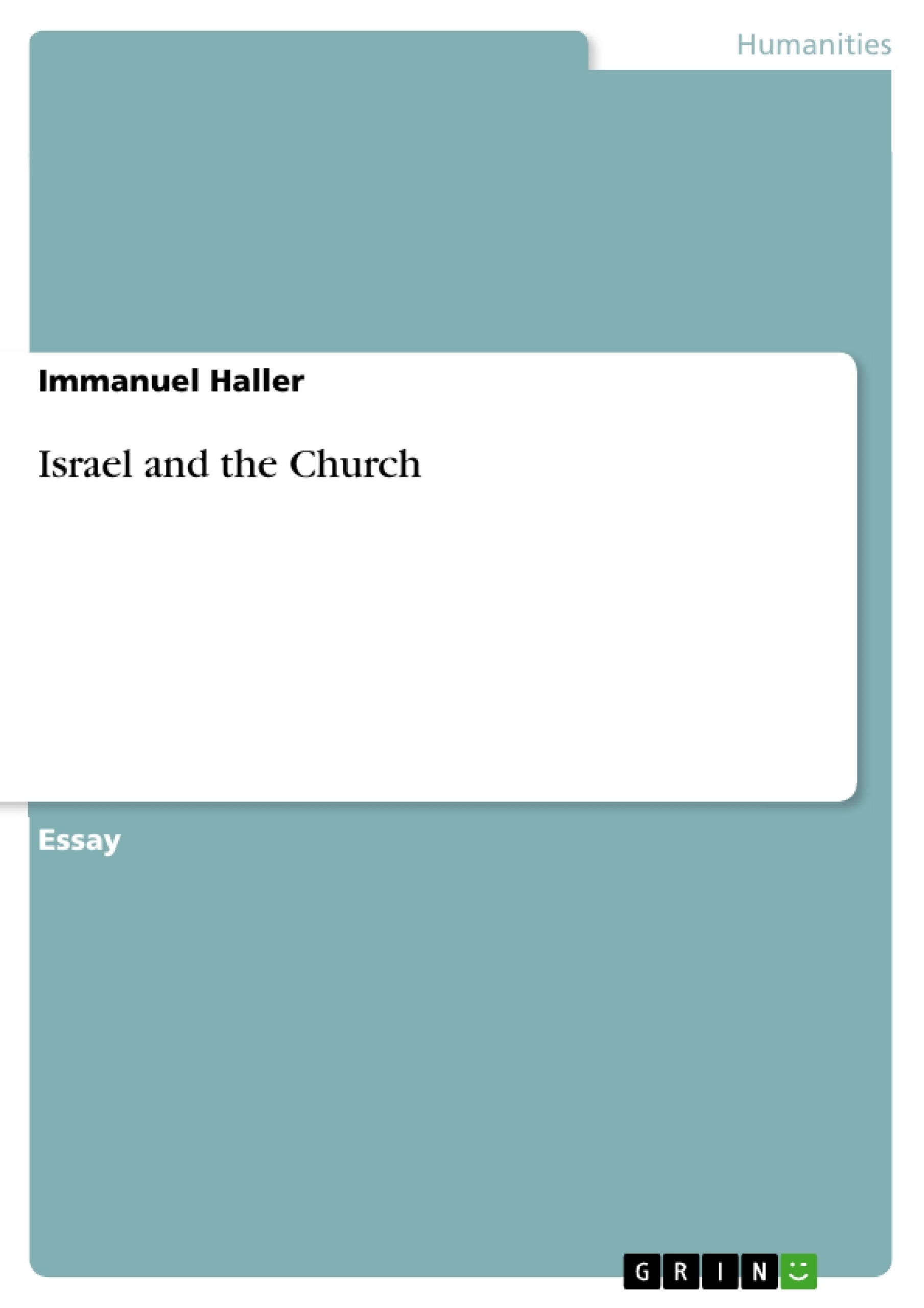The relationship of Israel to the New Testament Church has always been a great theological battleground, and a challenging topic among Christians since the early days of the church. On the one hand some reformed Theologians see literal Israel as virtually swallowed
up or displaced by the church or spiritual Israel. On the other hand, dispensationalists regard Israel and the Church as two eternally separate entities with which God deals in different
ways. This papers aim is to present an ecclesiological argument regarding the topic of the “Church and Israel.”
Table of Contents
- INTRODUCTION
- ISRAEL AND THE CHURCH
- The Olive Tree
- The enigma of the Olive Tree
- The Olive Tree is not the Church
- The Olive Tree is not Israel
- The meaning of the Olive Tree
- God's covenant with mankind
- Abraham
- God's people by faith
- God's identification with His people
- God's people in the New Testament
- Similarity of the church and spiritual Israel
- A true Jew
- Promises
- The presence of God.
- Faith not Law.
- Gentiles provoke Jews.
- Difference between Israel and the Church
- Empirical and Spiritual Israel
- The Country of Israel
- Spiritual Restoration
- CONCLUSION
Objectives and Key Themes
This essay aims to provide an ecclesiological argument concerning the relationship between the Church and Israel. It focuses on understanding the olive tree metaphor in Romans 11, examining God's covenant with mankind, and exploring both the similarities and differences between Israel and the Church. The eschatological significance of Israel is not taken into consideration.
- The interpretation of the olive tree metaphor in Romans 11.
- God's covenant with mankind and its implications for Israel and the Church.
- Similarities between the Church and spiritual Israel.
- Distinction between Israel and the Church.
- The concept of spiritual Israel.
Chapter Summaries
The introduction establishes the theological significance of the relationship between Israel and the Church, highlighting differing viewpoints among Christian theologians. The essay then delves into the meaning of the olive tree in Romans 11, examining its symbolism and its relation to both the Church and Israel.
The following sections explore the covenant of God with mankind, tracing its development from Abraham through to the New Testament. Key elements of the covenant, such as God's identification with His people, the role of faith, and the promise of God's presence are discussed.
The chapter concludes by outlining the similarities and differences between the Church and Israel. The distinction between empirical and spiritual Israel is explored, highlighting the importance of understanding the concept of spiritual restoration.
Keywords
The core themes of this essay revolve around the relationship between Israel and the Church, the interpretation of the olive tree metaphor in Romans 11, the covenant of God with mankind, and the concept of spiritual Israel. Key terms include: ecclesiology, covenant, olive tree, Abraham, faith, promises, spiritual Israel, empirical Israel, and spiritual restoration.
Frequently Asked Questions
What is the significance of the "Olive Tree" metaphor in Romans 11?
The metaphor is used to explain the relationship between Israel and the Church, representing the root of God's promises and how Gentiles are grafted into the covenant.
Is the Church considered "spiritual Israel"?
Some theologians argue that the Church functions as spiritual Israel, sharing in the promises made to Abraham through faith rather than biological descent.
What are the main differences between Israel and the Church?
The essay explores distinctions such as the difference between empirical (literal/national) Israel and the spiritual community of believers known as the Church.
How does faith play a role in God's covenant with mankind?
Faith is presented as the primary means by which both Jews and Gentiles become part of God's people, moving beyond a strict adherence to the Law.
What is the dispensationalist view on Israel and the Church?
Dispensationalists regard Israel and the Church as two eternally separate entities with which God deals in distinct ways across different time periods.
- Citar trabajo
- Immanuel Haller (Autor), 2007, Israel and the Church, Múnich, GRIN Verlag, https://www.grin.com/document/196319



